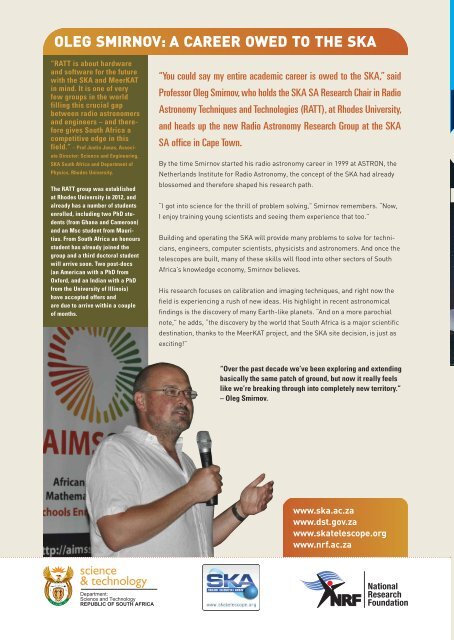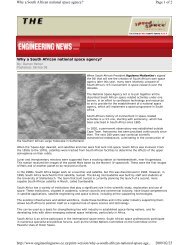Number 19 - March 2013 - SKA
Number 19 - March 2013 - SKA
Number 19 - March 2013 - SKA
Create successful ePaper yourself
Turn your PDF publications into a flip-book with our unique Google optimized e-Paper software.
OLEG SMIRNOV: A CAREER OWED TO THE <strong>SKA</strong>“RATT is about hardwareand software for the futurewith the <strong>SKA</strong> and MeerKATin mind. It is one of veryfew groups in the worldfilling this crucial gapbetween radio astronomersand engineers – and thereforegives South Africa acompetitive edge in thisfield.” – Prof Justin Jonas, AssociateDirector: Science and Engineering,<strong>SKA</strong> South Africa and Department ofPhysics, Rhodes University.The RATT group was establishedat Rhodes University in 2012, andalready has a number of studentsenrolled, including two PhD students(from Ghana and Cameroon)and an Msc student from Mauritius.From South Africa an honoursstudent has already joined thegroup and a third doctoral studentwill arrive soon. Two post-docs(an American with a PhD fromOxford, and an Indian with a PhDfrom the University of Illinois)have accepted offers andare due to arrive within a coupleof months.“You could say my entire academic career is owed to the <strong>SKA</strong>,” saidProfessor Oleg Smirnov, who holds the <strong>SKA</strong> SA Research Chair in RadioAstronomy Techniques and Technologies (RATT), at Rhodes University,and heads up the new Radio Astronomy Research Group at the <strong>SKA</strong>SA office in Cape Town.By the time Smirnov started his radio astronomy career in <strong>19</strong>99 at ASTRON, theNetherlands Institute for Radio Astronomy, the concept of the <strong>SKA</strong> had alreadyblossomed and therefore shaped his research path.“I got into science for the thrill of problem solving,” Smirnov remembers. “Now,I enjoy training young scientists and seeing them experience that too.”Building and operating the <strong>SKA</strong> will provide many problems to solve for technicians,engineers, computer scientists, physicists and astronomers. And once thetelescopes are built, many of these skills will flood into other sectors of SouthAfrica’s knowledge economy, Smirnov believes.His research focuses on calibration and imaging techniques, and right now thefield is experiencing a rush of new ideas. His highlight in recent astronomicalfindings is the discovery of many Earth-like planets. “And on a more parochialnote,” he adds, “the discovery by the world that South Africa is a major scientificdestination, thanks to the MeerKAT project, and the <strong>SKA</strong> site decision, is just asexciting!”NS“Over the past decade we’ve been exploring and extendingbasically the same patch of ground, but now it really feelslike we’re breaking through into completely new territory.”– Oleg Smirnov.www.ska.ac.zawww.dst.gov.zawww.skatelescope.orgwww.nrf.ac.za








